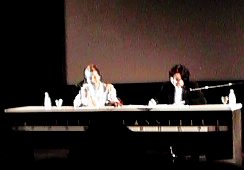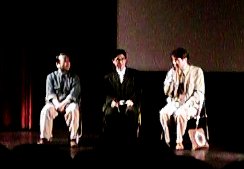
Au retour de Abe Kobo at Institut Franco-Japonais de Tokyo

Yasiro Seiti, playwright and novelist, died on January 11 at age of 71. He was born on April 10 1927 in Ginza, Tokyo. In 1945, he entered the Waseda University for French drama and joined the Haiyuza company, for which he translated Moliere's comedies. He moved to the Bungakuza company and wrote his first play Hatarakibati (A worker bee, in 1950). In 1955, he got Kisida Kunio Award with Hekiga (A wallpainting). In 1963, he took part in set up the new company named NLT (New Literary Theatre) with Misima Yukio.
In 1968, he got conversion to Catholicism. His masterpieces are the trilogy of Ukiyoe painters; Syaraku-ko (On Syaraku, in 1972), Hokusai Manga (Hokusai's sketches in 1973 ) and Inrakusai Esen (Esen, lustful painter, in 1975). In his last works, he wrote purity of Christian love. He wrote a single actress drama, Yaya, for his daughter Mariya Tomoko, lovely actress. Yaya, heroin of this work, was an innocent girl and was worshipped by Ryokan, Buddhist saint in Edo era; but she jilted him and became whore. In her last years, she met him again to get the love. (March 9)
Yosimoto Ryume published the last and 74th issue of his little magazine Siko on January 20. (March 9)
City government of Tyohu, where Abe Kobo lived since 1959 to his death, holds his exhibition at the city hall TADUKURI in front of Tyohu station of Keo Line, since January 6 to February 15 1998. (March 9)
Sibusawa Takasuke, poet and critic, died on February 8 at age of 67.He was born on October 22 1930 in Nagano prefecture. He studied Rimbaud at Tokyo Foreign languages and studies University and Tokyo University; he was man of French literature.
His first masterpiece is Urusi aruiha Suisyo-gurui (The japan or a crystalmania, in 1969), in which he described inner scenes of a passionate intellect. He got the Rekite Award with Ware Arcadia nimo ari (Memento Mori, in 1974) and got Takami Zyun Award with Kairo (A corridor, in 1980), in which he reached to Basyo like Karumi (poetical awakening). (March 9)
For her 100th anniversary, the exhibition of Uno Tiyo's World started since February 27 to March 11 at Mitukosi Museum in Sinzyuku, Tokyo. They exhibit not only manuscripts but Kimonos, which she designed, Portraits of her famous lovers, including Ozaki Siro and Togo Sezi. They also show her film interview, with which her young female readers are impressioned.
This exhibition will be held in Hirosima, Kurasiki, Sapporo, Matue and Hukuoka. (March 9)
Kodansya Co. began to publish the complete works of Haniya Yutaka in 19 volumes. Fist one contains his legendary novel Sire (Death Spirits, in 1946 - 1996). (March 9)
Hukusima Ziro, teacher of a high-school in Kyusyu area, published the first part of his auto-biographical novel, titled as Misima Yukio -- Turugi to Kanbeni (Misima Yukio -- a sword and rouge refined in winter), in which he confessed the secret connection with Misima Yukio, in April issue of Bungakukai Magazine.
Hukusima was born in 1930 in Kumamoto prefecture and he went to university in Tokyo. When he was 21 years old, he read the first part of Misima's Kinziki (The forbidden color), in which Misima described Tokyo gay life and a gay spot named Ledon. Exciting with this work, he dared to visit Misima and was welcomed; they were fallen in love soon. But he encountered a beautiful boy named Yu-chan, who is the model of Minami Yuiti, hero of Kinziki, and had been loved by Misima. He found that he was no more than a substitute for Yu-chan and felt inferior to broken heart in four months. Some scholars thought that this crisis would make Misima change a plot of Kinziki.
Their connection revived after 10 years. Misima wrote to Hukusima many letters, in which he told that he wanted to write more of right-wing novels in their beauty. For Misima, ultranationalism was nothing but an aesthetic problem. Hukusima sold them 5 years ago, but 10 of which (since 1962 to 1967) were found by a rare book seller in Zinbotyo, Tokyo.
Bunge Syunzyu Co. published the whole of Turugi to Kanbeni on March 9.(March 9; Updated on March 31)
Murakami Haruki began to publish serially a documentary on believers of Aum Cult Order, titled as Post Underground from April issue of Bunge Syunzyu magazine. He interviewed many Aum believers and ex-believers, like he interviewed sufferers of Aum Salin case in Underground in 1997. He said that the Japanese society is so intolerant that it has no room for stragglers, who are obliged to entrust themselves to such unsocial groups as Aum Cult Order. (March 10)
Hiraoka Iitiro, the son of Misima Yukio, claimed to the Tokyo regional court that Hukusima Ziro's Turugi to Kanbeni(A sword and rouge refined in winter) had to be prohibited to publish and recovery of its all copies, because Hukusima quoted 15 of Misima's unpublished letters without leave in his book.
On March 30, The Tokyo regional court judged that Hukusima and Bunge Syunzyu Co. pirated copyright of Misima family and that Bunge Syunzyu Co. had to recover its all copies within 7 days.
Amamiya Hideki, the chief secretary of Bunge Syunzyu Co., announced that I regretted that the sexual key of literature of Misima was going to hide because of abuse of their copyright, although Bunge Syunzyu Co. obeyed the judgment. (March31)

